
Prochilodus lineatus, the streaked prochilod, is a species of ray-finned fish in the family Prochilodontidae. It is native to the Paraná—Paraguay and Paraíba do Sul river basins in South America. It performs long breeding migrations and supports very important fisheries.
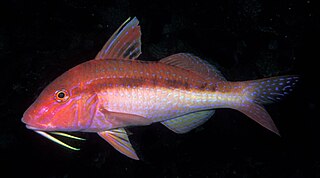
Upeneichthys lineatus, also known as the blue-striped mullet, blue-lined goatfish. blue-striped goatfish, blue-spotted goatfish and blue striped red mullet, is a species of marine ray-finned fish, a goatfish from the family Mullidae. It is native to the Pacific coast of Australia. It occurs in sheltered areas over rocky and sandy substrates and can be found 5 to 100 metres, though rarer below 40 metres (130 ft). This species can reach a length of 40 centimetres (16 in) FL. This species is commercially important.

The lined catshark or banded catshark is a species of shark belonging to the family Pentanchidae, the deepwater catsharks. It is found in the waters off the coasts of Beira, Mozambique, to East London, and South Africa between latitudes 19°S and 31°S, from the surface to 290 m. It can grow up to 56 cm in length.

The striped panchax is a species of killifish, of the genus Aplocheilus. An aquarium variant of this species with a more yellowish coloration is known as golden wonder killifish. The striped panchax inhabits fresh and brackish waters of India and Sri Lanka. It is found in streams, rivers, swamps, and paddy fields. This fish grows to a length of 10 cm (4 in). Most male A. lineatus measure around 7 centimetres (3 in), but the fish can grow up to 10 centimetres (4 in) under excellent conditions, especially if brought to the end of its life expectancy, around 6 years. It possesses a parietal eye which permits it to see prey insects and predators above it on the surface. A. lineatus can jump very well.
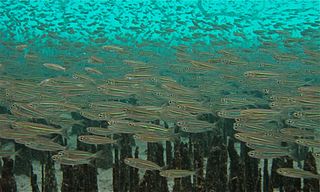
The lined silverside is a species of fish in the family Atherinidae. It is found in Indonesia and the Philippines. This species was described as Atherina lineata by Albert Günther in 1872 with the type locality given as Cebu.
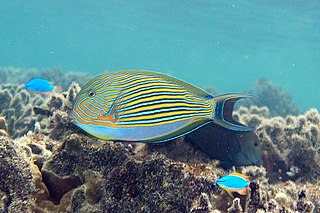
Acanthurus lineatus, the lined surgeonfish, blue banded surgeonfish, blue-lined surgeonfish, clown surgeonfish, pyjama tang, striped surgeonfish, and zebra surgeonfish, is a species of marine ray-finned fish belonging to the family Acanthuridae, the surgeonfishes, unicornfishes and tangs. This species is found in the Indo-Pacific region.
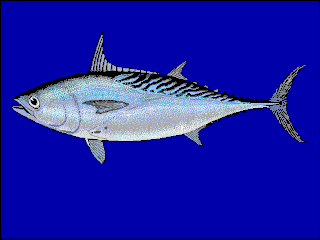
Euthynnus is a genus of ray-finned bony fish in the family Scombridae, or mackerel family, and in the tribe Thunnini, more commonly known as the tunas.

Euthynnus lineatus, the black skipjack tuna or black skipjack, is a species of ray-finned bony fish in the family Scombridae. It belongs to the tribe Thunnini, better known as the tunas.

Labiobarbus is a genus of cyprinid fish found in Southeast Asia. It currently contains nine described species.

Surface wave detection by animals is the process by which animals, such as surface-feeding fish are able to sense and localize prey and other objects on the surface of a body of water by analyzing features of the ripples generated by objects' movement at the surface. Features analyzed include waveform properties such as frequency, change in frequency, and amplitude, and the curvature of the wavefront. A number of different species are proficient in surface wave detection, including some aquatic insects and toads, though most research is done on the topminnow/surface killifish Aplocheilus lineatus. The fish and other animals with this ability spend large amounts of time near the water surface, some just to feed and others their entire lives.

Plotosus lineatus, commonly known as the striped eel catfish, is a species of eeltail catfishes belonging to the family Plotosidae. Like most other members of the genus Plotosus, they possesses highly venomous spines that they can use to sting when threatened. The venom can cause mild to severe symptoms in humans. P. lineatus is native to the Indo-Pacific but has become introduced to the Mediterranean via the Suez Canal as a Lessepsian migrant.

Labiobarbus ocellatus is a species of cyprinid fish from Asia that occurs in Malaysia and Indonesia.
Labiobarbus siamensis is a freshwater fish of the family Cyprinidae native to the rivers of Thailand.

The golden-lined spinefoot, also known as the goldlined rabbitfish or lined rabbitfish, is a species of marine ray-finned fish, a rabbitfish belonging to the family Siganidae. It is found in the tropical Western Pacific and along the coasts of northern Australia.
Labiobarbus cyanopareja is a freshwater fish of the family Cyprinidae endemic to the Philippines. This species is of doubtful validity and some authorities consider that L. cyanopareja is a junior synonym of Osteochilus vittatus.
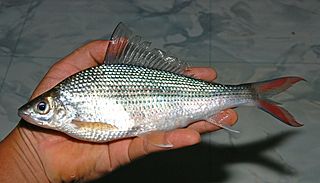
Labiobarbus fasciatus is a species of ray-finned fish in the genus Labiobarbus found in Indonesia and Malaysia.

The signal barb is a species of ray-finned fish in the genus Labiobarbus found in the southern Malay peninsula.
Labiobarbus lamellifer is a species of ray-finned fish in the genus Labiobarbus found in eastern Borneo.

Labiobarbus leptocheilus is a species of ray-finned fish in the genus Labiobarbus found in the Mekong, Salween, Chao Phraya and Xe Bangfai basins, and from the Malay Peninsula, Sumatra, Java and Borneo.
Labiobarbus sabanus is a species of ray-finned fish in the genus Labiobarbus endemic to the Kinabatangan and Segama river basins in Sabah.















